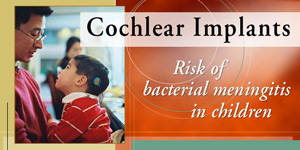Home
| About the 2002 Study |
About the 2004 Study |
Recommendations |
Questions and Answers | Resources (pdf)


Spanish Version
Many people have received cochlear
implants to help them hear and communicate. CDC and the Food and Drug
Administration (FDA) carried out a study in 2002 to learn more about a
possible link between cochlear implants and bacterial meningitis in
children with cochlear implants. This study found that bacterial
meningitis occurred more often in children with all types of cochlear
implants than in children of the same age group in the general
population. It also found that children with an implant with a
positioner (a piece used in some implant models) were much more likely
to get bacterial meningitis than children with other types of cochlear
implants. (The implant with a positioner was voluntarily taken off the
market by the manufacturer in July 2002.) This 2002 study had two
purposes: (1) to find out how many children who had cochlear implants
got bacterial meningitis afterwards, and (2) to find out if there are
factors that might make it more likely that someone would get meningitis
after getting a cochlear implant.
After the 2002 study was completed, the FDA continued to receive reports
of bacterial meningitis in children with cochlear implants. Because of
these new reports, CDC and the FDA updated the 2002 study by looking at
reports that were received up to 2 years after the 2002 study ended. The
purpose of this updated study was to find out if children with cochlear
implants continued to be more likely to get bacterial meningitis than
children of the same age group in the general population even after they
had their implant in place for more than 2 years.
Following are links that provide some
basic information about the study results, as well as sources where you
can find more about cochlear implants and meningitis
Because CDC is a public health agency, CDC
personnel cannot give individual medical advice. If after reading
through the information provided in this website you still have
questions about cochlear implants or meningitis as they apply to you or
to someone you know, you should contact your doctor. A personal doctor
can get a complete medical history and prescribe treatment, and is your
best source for medical advice.
We at CDC realize that this work could
not have been done without the help of the parents of children with
cochlear implants, state and local health departments, other federal
health agencies, and cochlear implant manufacturers. Their cooperation
is greatly appreciated.
[Return
to Top]
Date:
November 01, 2007
Content source: National Center on Birth Defects and Developmental
Disabilities